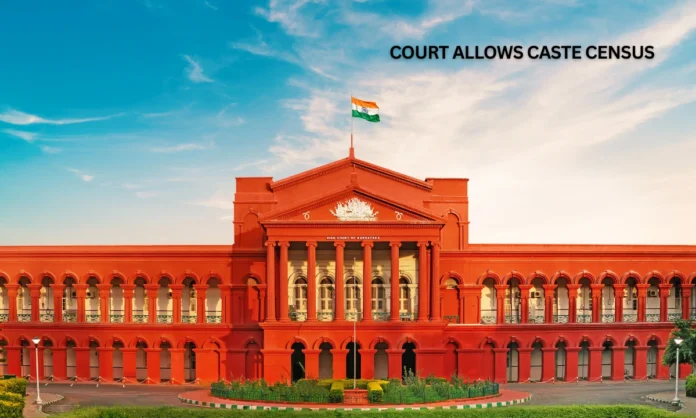Key Highlights:
- Karnataka High Court refuses to halt the state’s ₹420 crore socio-economic and educational survey but mandates voluntary participation and data confidentiality
- Court directs the Karnataka State Commission for Backward Classes to issue public notifications clarifying that participation in the caste census is not mandatory
- Survey covering 2 crore households across Karnataka continues with 1.75 lakh enumerators, primarily government school teachers, conducting door-to-door data collection
Opening Overview
The Karnataka High Court has delivered a landmark interim order regarding the state’s controversial socio-economic and educational survey, widely recognized as the caste census, allowing the exercise to proceed while imposing stringent protective measures. Chief Justice Vibhu Bakhru and Justice CM Joshi’s division bench declined to stay the ongoing survey on Thursday, acknowledging the significant resources already invested in the project. The caste census represents one of Karnataka’s most ambitious data collection initiatives, with the state government allocating approximately ₹420 crore for the comprehensive exercise covering over 2 crore households. This judicial decision comes amid intense legal challenges from various community organizations questioning the survey’s constitutional validity and potential privacy implications.
Survey Implementation and Scope
The Karnataka State Commission for Backward Classes has mobilized an extensive infrastructure to conduct this caste census, deploying approximately 1.75 lakh enumerators across the state between September 22 and October 7, 2025. The survey employs a comprehensive 60-question questionnaire designed to capture detailed information about citizens’ social, economic, and educational backgrounds. Government school teachers, trained as primary enumerators, are conducting door-to-door visits equipped with official identification cards and mobile applications to record household data.
- Each household receives a Unique Household ID (UHID) through geo-tagging using electricity meter numbers, ensuring comprehensive coverage
- The survey includes provisions for online participation and a dedicated helpline (8050770004) for citizens who miss enumerator visits
- Data collection encompasses caste details, sub-caste information, religion, education levels, occupation, income, assets, and government scheme beneficiaries
The caste census has encountered technical challenges in several districts, including Shivamogga, Haveri, Ballari, Chitradurga, and Kodagu, where server issues temporarily delayed the enumeration process. Despite these initial setbacks, officials report that surveys resumed after resolving technical problems, maintaining momentum toward the December deadline for report submission.
Constitutional and Legal Challenges
Multiple community organizations, including the Rajya Vokkaliga Sangha, Akhila Karnataka Brahmana Mahasabha, and Veerashaiva Lingayat Mahasabha, have filed petitions challenging the caste census on constitutional grounds. The petitioners argue that the state government is conducting a caste-based enumeration under the guise of a survey, claiming such exercises fall under Union government jurisdiction according to constitutional provisions.
- Petitioners contend that the survey represents a “colourable exercise” designed for political gains rather than genuine welfare purposes
- Legal challenges highlight concerns about potential data weaponization and social fabric disruption
- The Centre’s Additional Solicitor General characterized the exercise as a “census cloaked as survey,” questioning its legal foundation
The caste census faces criticism regarding its methodology and scope, with petitioners pointing to Karnataka’s previous 2015 survey that cost ₹150 crore but never released public results. Legal experts argue that contemporary data already exists through national census mechanisms, questioning the necessity of a separate state-level enumeration.
Court’s Protective Directions
The Karnataka High Court’s interim order establishes comprehensive safeguards for the caste census while allowing its continuation, recognizing the substantial financial commitment already made by the state. The bench emphasized that approximately ₹20 crore has been spent with an additional ₹350 crore earmarked for completion, making immediate suspension impractical.
- The Karnataka State Commission for Backward Classes must ensure complete data confidentiality with access restricted to authorized personnel only
- Public notifications must clearly state that participation in the caste census is entirely voluntary and citizens cannot be compelled to provide information
- Enumerators are prohibited from pressuring, persuading, or cajoling participants who decline to share details
The court ordered the Commission to file an affidavit within one working day, detailing specific measures implemented to protect collected data confidentiality and storage security. This directive addresses privacy concerns raised under the Supreme Court’s KS Puttaswamy ruling on privacy rights, ensuring citizens’ right to control information dissemination.
Political and Social Implications
The caste census has generated significant political controversy, with opposition BJP leaders characterizing it as an “anti-Hindu” exercise designed to fragment society for electoral advantage. Karnataka Leader of Opposition R Ashoka specifically criticized the inclusion of caste names prefixed with religious identifiers like “Kuruba Christian” and “Brahmin Christian” in the survey handbook.
- The Congress government, led by Chief Minister Siddaramaiah, defends the survey as essential for targeted welfare policy formulation
- State officials argue that accurate caste-wise socio-economic data is crucial for effective resource allocation and scheme implementation
- Community leaders from dominant groups like Vokkaligas have issued guidelines for their members to identify simply as “Hindu” and their primary caste identity
The caste census aims to address historical data gaps in understanding Karnataka’s demographic composition, particularly regarding Other Backward Classes representation and socio-economic status distribution. Previous caste survey reports have recommended significant changes to reservation structures, including proposals to increase OBC quotas from 32% to 51%, challenging existing Supreme Court limitations.
Closing Assessment
The Karnataka High Court’s measured approach to the caste census controversy reflects the complex balance between state welfare objectives and individual privacy rights in contemporary India. By refusing to halt the survey while imposing strict confidentiality and voluntary participation requirements, the court has enabled continued data collection under enhanced protective frameworks. The caste census represents a significant test case for state-level demographic data collection initiatives, with potential implications for similar exercises across other Indian states seeking updated socio-economic information for policy formulation. The Commission’s December deadline for report submission will determine whether this ambitious ₹420 crore investment translates into actionable insights for Karnataka’s welfare policy architecture, while the legal challenges continue to evolve through ongoing judicial proceedings.


